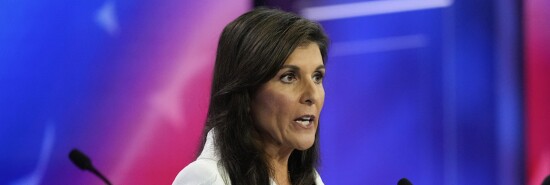
Nikki Haley’s dangerous idea
Byron York
NIKKI HALEY’S DANGEROUS IDEA. So far, no Republican candidate has been able to make a serious run at former President Donald Trump, who remains far ahead of the GOP presidential pack. But Nikki Haley, the former South Carolina governor and Trump’s ambassador to the United Nations, has managed to grab some momentum in the race for second place. She’s done it in large part by turning in three good performances at the first Republican debates, managing to find the right position and capture the right tone on issues from foreign policy to abortion.
On Tuesday, though, Haley committed a big unforced error that has given her opponents new ammunition to use against her. Or maybe it wasn’t an error, and Haley simply revealed views that a significant number of voters will find troubling. In any case, Haley has created a new controversy for herself.
It happened during an appearance on Fox News. A voter in the audience asked Haley about anti-Israel demonstrations in some cities and antisemitic rhetoric on some college campuses. “Is there a limit, in your opinion, to free speech?” the voter asked. “We all know you can’t go into an airport and shout bomb, and yet right now, you can chant on college campuses to kill all the Jews. … What are the limits when it threatens the safety of a group of people or incites violence against them?”
Subscribe today to the Washington Examiner magazine that will keep you up to date with what’s going on in Washington. SUBSCRIBE NOW: Just $1.00 an issue!
“We’re blessed because we have free speech,” Haley began. “We never want that to go away. But the difference is when you are pushing violence, when you’re pushing genocide.”
Haley blamed much of the problem on social media and on forces outside the United States. “If you look at social media, the misinformation and the dramatic sides of social media are instigating this,” Haley said. “Why? Because it’s being pushed by Russia, China, Iran, and North Korea. It is why, when I get into office, the first thing we have to do — social media accounts, social media companies, they have to show America their algorithms. Let us see why they’re pushing what they’re pushing. The second thing is every person on social media should be verified by their name. First of all, it’s a national security threat. When you do that, all of a sudden, people have to stand by what they say. And it gets rid of the Russian bots, the Iranian bots, and the Chinese bots. And then you’re gonna get some civility when people know their name is next to what they say, when they know their pastor, their family members are going to see it. It’s going to help our kids, and it’s going to help our country.”
It was a stunningly broad, even draconian, answer to a specific question. There seems little doubt that the major social media companies could do more to ban the most virulently antisemitic speech, particularly when that speech, as Haley and the questioner noted, includes threats of violence. But from that, Haley moved to her intention to ban anonymous content on social media in the name of addressing a “national security threat” and to promote “civility.”
It’s a bad idea. “Anonymous speech really is fundamental to the history of the United States,” law professor Jeff Kosseff said in an article published by Freedom Forum. “In fact, many arguments for independence during the colonial era were made anonymously or pseudonymously — with a pen name. So were arguments in support of the Constitution while it was being drafted.” The most famous of those, of course, was the Federalist Papers, which James Madison, Andrew Hamilton, and John Jay published under the pen name “Publius.”
“The First Amendment protects anonymity (in most cases),” the Freedom Forum article continued. “It also protects the right to say unpopular or even abhorrent things (with some exceptions), anonymously or otherwise. ‘You can’t just use a subpoena to unmask someone who’s been mean to you,’ says Kosseff. ‘The courts have set a fairly high First Amendment standard for being able to subpoena identifying information of online posters.'”
Haley’s approach would throw much of that protection out the window, with the president of the United States pushing for the identification of every anonymous poster in America. On Tuesday evening, I asked the Haley campaign about her statement — isn’t it troubling for people concerned about privacy and freedom of speech? Below is the campaign’s response, in full:
We all know that America’s enemies use anonymous bots to spread anti-American lies and sow chaos and division within our borders. Nikki believes social media companies need to do a better job of verifying users so we can crack down on Chinese, Iranian, and Russian bots. That’s common sense.
That didn’t really address the question. Of course social media companies can crack down on foreign bots. They do it all the time and could do it more. But what Haley said was far broader than that, suggesting the infringement of constitutionally protected speech not only for national security reasons but to achieve some sort of unspecified “civility.” If Haley sticks to her position, she’ll have a lot to explain in the next Republican debate.
For a deeper dive into many of the topics covered in the Daily Memo, please listen to my podcast, The Byron York Show — available on Radio America and the Ricochet Audio Network and everywhere else podcasts can be found.
